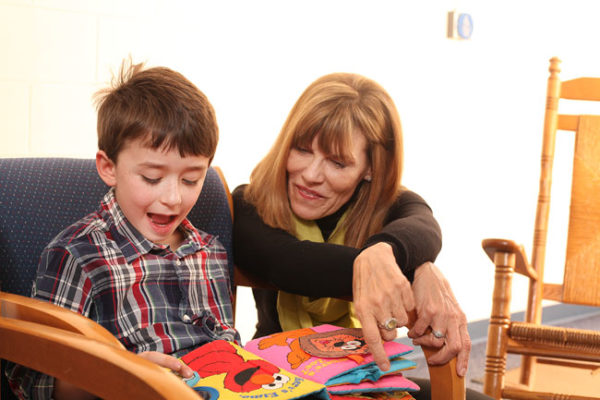
Researchers in the Vanderbilt KidTalk Lab are joining researchers at two other universities to conduct a clinical trial of an intervention for young children with language delays in a study funded by the National Institute of Deafness and Communication Disorders.
The study, “Maximizing outcomes for preschoolers with developmental language disorder: Testing the effects of a sequentially targeted naturalistic intervention,” is the first U01 grant funded by NIDCD that focuses on language intervention with young children.
A U01 grant is a Research Project Cooperative Agreement used when an NIH institute has substantial programmatic involvement with the project investigators. In this case, the research team has collaborated closely with NIDCD in the design of the Phase II Clinical Trial.
The $6.3 million award will span five years. The project will enroll 108 children and their caregivers across sites.

“We are evaluating the effects of Enhanced Milieu Teaching-Sentence Focus,” said Ann Kaiser, principal investigator of the Vanderbilt KidTalk study site. Kaiser is the Susan Gray Chair of Education and Human Development and professor of special education and psychology at Vanderbilt University’s Peabody College of education and human development and a Vanderbilt Kennedy Center investigator. “This is an early language intervention carried out by parents and therapists during play and everyday home activities.”
The intervention spans the critical period in development from 30 to 48 months when children are rapidly expanding their vocabulary and transitioning into using sentences.
“Our hypothesis is that this intervention will result in better complex language skills at 4 years of age and ultimately will help children get on track for reading and academic success,” Kaiser said. “Based on previous research, we know that toddlers who are delayed in both producing and understanding language are at high risk for persistent developmental language disorders. We expect that this longer term intervention focusing on early sentence development will be more effective than community-based early intervention in closing the gap between children with early language delays and their typically developing peers.”
The other principal investigators and participating universities are Megan Roberts of Northwestern University and Pamela Hadley of University of Illinois Urbana-Champaign; as well as two additional investigators, Matt Rispoli of the University of Illinois Urbana-Champaign; and Ryne Estabrooke of Northwestern University.
The study will begin recruiting families at Vanderbilt and Northwestern starting Jan. 1, 2019, and will continue enrollment for the next three years. Children must be 27 to 30 months old, have a language delay, speak English and have no other diagnoses.
Eligible families will be enrolled in the study for 18 months and will receive compensation, toys and language intervention materials, as well as one-on-one intervention sessions in the home for those in the treatment group. Children will be able to continue to participate in their existing early intervention programs while enrolled in the study.
For more information, contact the Vanderbilt Kidtalk Lab (615) 322-8160 or email kidtalk@vanderbilt.edu.
Vanderbilt KidTalk is a research group in the Department of Special Education at Vanderbilt’s Peabody College. It includes multiple projects to study language growth in young children with disabilities. The interventions are natural, enjoyable and can be done by parents and teachers.
Children who are taught using KidTalk procedures typically learn new vocabulary, talk in longer sentences, and develop strong, positive relationships with their parents, teachers and peers.